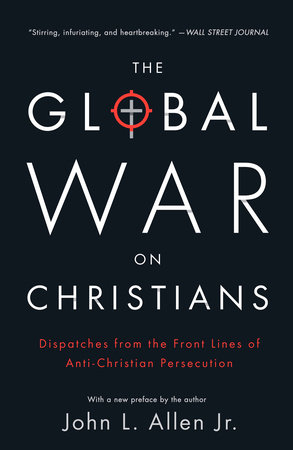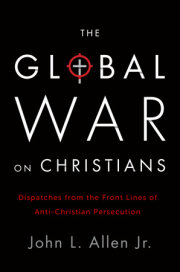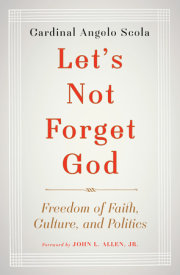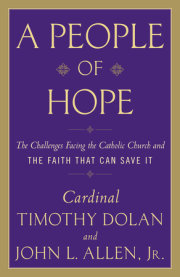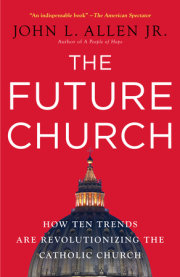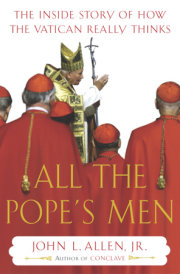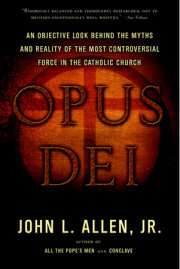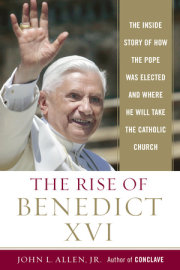INTRODUCTION
This book is about the most dramatic religion story of the early twenty-first century, yet one that most people in the West have little idea is even happening: the global war on Christians. We're not talking about a metaphorical "war on religion" in Europe and the United States, fought on symbolic terrain such as whether it's okay to erect a nativity scene on the courthouse steps, but a rising tide of legal oppression, social harassment, and direct physical violence, with Christians as its leading victims. However counterintuitive it may seem in light of popular stereotypes of Christianity as a powerful and some times oppressive social force, Christians today indisputably are the most persecuted religious body on the planet, and too often their new martyrs suffer in silence. The Me'eter military camp and prison, located in the Eritrean desert off the coast of the Red Sea, is a compelling place to begin the tale.
The prison's signature bit of cruelty is the use of crude metal ship ping containers to hold inmates, with so many people forced into these 40-by-38-foot spaces, designed to transport commercial cargo, that prisoners typically have no room to lie down and barely enough to sit. The metal exacerbates the desert temperatures, which means bone-chilling cold at night and wilting heat during the day. When the sun is at its peak, temperatures inside the containers are believed to reach 115 degrees Fahrenheit or higher. One former inmate, lucky enough to be released after serving up a coerced confession, described the containers as “giant ovens baking people alive.” Because prisoners are given little water, they sometimes end up drinking their own scant sweat and urine to stay alive.
When not in lockdown, prisoners are forced into pointless exercises such as counting grains of sand in the desert at midday, and scores die of heatstroke and dehydration. There are no toilets inside the containers, just crude buckets overflowing with urine and feces, placing inmates at risk of infection with diseases such as cholera and diphtheria. Prisoners have no contact with their families or friends, no legal representation, and no medical care. Forms of torture at Me’eter (also transliterated as “Meiter” and “Mitire”) include making inmates kneel on a tree trunk and beating the soles of their feet with rubber hoses; hanging prisoners by their arms and exposing them to the sun, sometimes for forty-eight hours or more; and forcing prisoners to walk barefoot over stones and thorns, with beatings for not going fast enough. Survivors say sexual abuse is also common.
Me’eter was opened in 2009 by Eritrea’s single-party regime, con- trolled by the People’s Front for Democracy and Justice, and is still going strong, despite the fact its horrors are well documented. Diplomatic cables released in 2011 by WikiLeaks reveal that U.S. officials had interviewed escapees from Eritrea’s concentration camps and passed along reports to the State Department.
Here’s how one female survivor described life at night inside the shipping containers in a 2009 book:
A single candle flickers, its flame barely illuminating the dark- ness. They never burn for more than two hours after the door is locked; there’s not enough oxygen to keep the flame alive. The air is thick with a dirty metallic tang, the ever-present stench of the bucket in the corner, and the smell of close-pressed, unwashed bodies. Despite the proximity of so many people, it’s freezing cold.
This survivor described being forced to squat on her haunches and lift three different sizes of rocks while moving them from one side of her body to another, over and over again. At one point she was tossed into a container with a female inmate who had been beaten so badly her uterus was actually hanging outside her body. The survivor desperately tried to push the uterus back in, but cries for help went unanswered and the woman died in agonizing pain.
The unavoidable question is why the abuse at Me’eter doesn’t arouse the same horror and intense public fascination as the celebrated atrocities that unfolded at Abu Ghraib, for instance, or at Guantanamo Bay. Why hasn’t there been the same avalanche of investigations, media exposés, protest marches, pop culture references, and the other typical indices of scandal? Why isn’t the whole world abuzz with outrage over the grotesque violations of human rights at Me’eter?
In part it’s because Abu Ghraib and Guantanamo Bay were operated by the United States, a country that styles itself a champion of democracy and the rule of law. Nobody really has the same expectations of Eritrea, a one-party state ruled since 1993 by a strongman who prevailed in a bloody civil war. More basically, however, the difference comes down to this: Abu Ghraib and Guantanamo Bay formed chapters in a war everyone cared about, meaning the U.S.-led “war on terror,” while Me’eter is an equally dramatic chapter in a war that almost no one is aware is even being waged.
S N AP S H O T S O F A G L O B AL W AR
For all intents and purposes, Me’eter is a concentration camp for Christians. It’s a military complex converted to house religious prisoners, most of whom adhere to a branch of Christianity not authorized by the state. While precise counts are elusive, most estimates say that some- where between two thousand and three thousand Christians are presently languishing in Eritrean prisons because of their religious beliefs. The testimony quoted above comes from an evangelical gospel singer named Helen Berhane, an Eritrean Christian jailed from 2004 to 2006 after refusing to sign a pledge promising not to engage in religious activities. She was released thanks to a worldwide pressure campaign, but most of her fellow Christians haven’t been so lucky.
Eritrea is far from an isolated case. The evangelical group Open Doors, devoted to monitoring anti-Christian persecution, estimates that one hundred million Christians worldwide presently face interrogation, arrest, torture, or even death because of their religious convictions. Protestant scholar Todd Johnson of Gordon-Conwell Theological Seminary, an expert on religious demography, has pegged the number of Christians killed per year from 2000 to 2010 at one hundred thou- sand. That works out to eleven Christians killed every hour, every day, throughout the past decade. Some experts question that number, but even the low-end estimate puts the number of Christians killed every day on the basis of religious hatred at twenty, almost one per hour.
This is a truly ecumenical scourge, in the sense that it afflicts evangelicals, mainline Protestants, Anglicans, Orthodox, Catholics, and Pentecostals alike. All denominations have their martyrs, and all are more or less equally at risk. A 2011 report from the Catholic humanitarian group Aid to the Church in Need described the worldwide assault on Christians as “a human rights disaster of epic proportions.”
Though such language could seem to smack of hyperbole, consider these snapshots of what’s happening:
• In Baghdad, Iraq, Islamic militants stormed the Syrian Catholic cathedral of Our Lady of Salvation on October 31, 2010, killing the two priests celebrating Mass and leaving a total of fifty-eight people dead. Though shocking, the assault was far from unprecedented: of the sixty-five Christian churches in Baghdad, forty have been bombed at least once since the beginning of the 2003 U.S.-led invasion. The effect of this campaign of violence and intimidation has been devastating for Christianity in the country. At the time of the first Gulf War in 1991, Iraq boasted a flourishing Christian population of at least 1.5 million. Today the high-end estimate for the number of Christians left is around 500,000, and many believe it could be as low as 150,000. Most of these Iraqi Christians have gone into exile, but a staggering number have been killed.
• India’s northeastern state of Orissa was the scene of the most violent anti-Christian pogrom of the early twenty-first century. In 2008, a series of riots ended with as many as five hundred Christians killed, many hacked to death by machete- wielding Hindu radicals; thousands more were injured, and at least fifty thousand were left homeless. Many Christians fled to hastily prepared displacement camps, where some languished for two years or more. An estimated five thousand Christian homes, along with 350 churches and schools, were destroyed. A Catholic nun, Sr. Meena Barwa, was raped during the mayhem, then marched naked through the streets and beaten. Police sympathetic to the radicals discouraged the nun from filing a report and declined to arrest her attackers.
• In Burma, members of the Chin and Karen ethnic groups, who are strongly Christian, are considered dissidents by the regime and routinely subjected to imprisonment, torture, forced labor, and murder. In October 2010, the Burmese military launched helicopter strikes in territories where the country’s Christians are concentrated. A Burmese air force source told reporters that the junta had declared these areas “ black zones,” where military personnel were authorized to attack and kill Christian targets on sight. Though there are no precise counts, thousands of Burmese Christians are believed to have been killed in the offensive.
• In Nigeria, the militant Islamic movement Boko Haram is held responsible for almost three thousand deaths since 2009, including eight hundred fatalities in 2012 alone. The movement has made a specialty out of targeting Christians and their churches, and in some cases they seem determined to drive Christians completely out of parts of the country. In December 2011, local Boko Haram spokespeople announced that all Christians in Nigeria’s northern Yobe and Borno states had three days to get out, and followed up with a spate of church bombings on January 5–6, 2012, which left at least twenty-six Christians dead, as well as two separate shooting sprees in which eight more Christians died. In the aftermath, hundreds of Christians fled the area, and many are still displaced. Over Christmas 2012, at least fifteen Christians are believed to have had their throats cut by Boko Haram assailants.
• North Korea is widely considered the most dangerous place in the world to be a Christian; roughly a quarter of the country’s two hundred thousand to four hundred thousand Christians are believed to be living in forced-labor camps because of their refusal to join the national cult around founder Kim Il Sung. The anti-Christian animus is so strong that even people with Christian grandparents are frozen out of the most important jobs—a grand irony, given that Kim Il Sung’s mother was a Presbyterian deaconess. Since the armistice in 1953 that stabilized the division of the peninsula, some three hundred thousand Christians in North Korea have simply disappeared and are presumed to be dead.
Subsequent chapters will recount similar episodes from other parts of the world, but the point should already be clear: in a remarkable number of global neighborhoods, being a Christian is hazardous to your health.
The ways and means of this war on Christians vary, but at its most extreme it’s a form of religious cleansing designed to wipe Christians off a particular part of the map. Take the case of southeastern Turkey, a zone bordering Syria where today Kurds and militant Turkish nationalists vie for control. At the beginning of the twentieth century there was a flourishing community of half a million Aramaic-speaking Christians in the area, keeping alive the language traditionally thought to have been spoken by Christ. By the end of the century, the Aramaic Christian population had shriveled to twenty-five hundred due both to violent persecution and to the daily pressures of de jure and de facto discrimination, and most people believe it’s only a question of time before it becomes an artifact of history.
Nura Ardin, eighty-five, is one such exile. He recently told journalists that his family stayed in the area as long as his oldest son was alive, because the son had made a promise to the local bishop to remain as long as the bishop did. Upon hearing of that vow, Ardin said, Turkish nationalists raided the family’s home one night in 1986 and shot his oldest son to death, whereupon the rest of the family decided to cut their losses and get out. Walking through southeastern Turkey’s ghost towns of empty Christian villages, one has the feeling that here the war on Christians is basically already over.
T H E R H ET O R I C O F W AR
“War” is probably the most overused term in politics, especially in the United States. Americans call pretty much everything a war—“war on poverty,” “war on drugs,” “war on terror,” “culture wars,” even a slightly self-parodying “war on Christmas.” During the 2012 election, several more alleged wars emerged, including a “war on women” and a “war on religion.” Generally such rhetoric is an invitation to hysteria. Believing that you don’t just disagree with someone but are at war with them makes it far more difficult to find common ground. After all, nobody wants to be the Neville Chamberlain of the war on Christmas.
Before going further, therefore, we must clearly identify the risks of describing the pattern of religious violence summarized above as a “war.”
• Calling it a “war” could suggest a degree of coordination to anti-Christian persecution that simply doesn’t exist. There’s no single enemy, and the problem can’t be solved with a single strategic approach.
• Using the imagery of war could come off as a call to arms, a way of urging Christians to stop turning the other cheek. The last thing the world needs is a contemporary version of the Crusader armies of yore, armed with AK-47 assault rifles and rocket-propelled grenades.
• Overheated rhetoric could inflame the situation, making life even more perilous for Christians who already carry a bull ’s- eye on their backs.
• Because “war” is so overused, cynics might regard talk of a “war on Christians” as just another bit of spin, a slogan cooked up to serve someone’s political interests.
Even with those cautions acknowledged, the question remains: What other word are we supposed to use? We’re talking about a massive, worldwide pattern of violence and oppression directed against a specific group of people, often explicitly understood by its perpetrators as part of a broader cultural and spiritual struggle. Granted, slapping the label “war” on political disagreements is often an exaggeration. By the same token, feckless reluctance to call something a “war” when it plainly is can also be counterproductive. Among other things, failure to call this a “war” can inhibit people from facing the situation with the necessary sense of urgency.
Although reasonable observers might be willing to accept that widespread religious violence constitutes a genuine war, they may still balk at a specific focus on Christians as its victims. Again, let’s tick off the most obvious reservations.
• Followers of other religions are suffering too. Many thoughtful Christian leaders in Nigeria hesitate to frame Boko Haram in terms of Christian/Muslim conflict, in part be- cause its largest pool of victims is actually composed of fellow Muslims. Similarly, while Syria’s Christians are paying a steep price, so too are other religious and ethnic groups in the country. Factions of the rebel alliance have taken up the chant “Christians to Lebanon, and Alawites to the sea!”
• Talking too much about a war “on Christians” could make the defense of religious freedom seem like a parochial matter of Christian self-interest, rather than principled support for the human rights of all people.
• Too much emphasis on Christians may fuel suspicions that advocacy of religious freedom is another chapter in Western colonialism, or a covert plot to promote Christian proselytism. Those perceptions are already strong in some quarters, and act as a trigger for violence.
Once again, even in the teeth of these hazards, there are compel- ling reasons for talking about a war “on Christians.” As we will see in the next chapter, the leading estimate holds that 80 percent of all acts of religious discrimination in the world today are directed at Chris- tians. If the defense of human rights and religious freedom is to mean anything, its cutting edge has to be formed by robust concern for the fate of these Christians. If the rhetoric of a war “on Christians” wakes people up to that reality, it will have served a purpose.
T H E “ W AR O N R E L I GI O N ” AN D T H E W AR O N C H R I S T IAN S
Precisely because the language of “war” is tossed around so readily, it’s important at the outset to make a clear distinction between two different conflicts in which perceived assaults on Christianity are involved.
• The “global war on Christians,” meaning violence and overt persecution directed at individual Christians as well as their churches and other institutions on the basis of their religious faith, the works of charity they perform, or the virtues they exhibit.
• A “war on religion” in the West, a phrase that many commentators in Europe and North America use to refer to what they see as a growing climate of secular hostility to religion, and to Christianity in particular. It usually involves tensions over the ability of faith-based institutions to both be true to their creeds and play a robust public role, rather than direct assaults on individuals.
In drawing this distinction, I’m aware that many thoughtful Christians don’t believe it’s ultimately tenable. Some Christian intellectuals believe that what’s going on in Western culture today is the first wave of a more violent assault on religion. Cardinal Francis George of Chicago memorably expressed where he believes Western society is heading in 2010: “I expect to die in bed, my successor will die in prison, and his successor will die a martyr in the public square.” (Not often quoted is George’s more hopeful footnote after the reference to the martyred bishop: “His successor will pick up the shards of a ruined society and slowly help rebuild civilization, as the church has done so often in human history.”)
Without passing judgment on such forecasts, the subject matter of this book is the literal war on Christians already under way in other parts of the world. Readers looking for a close examination of today’s church/state tensions in the United States and Europe, which the Catholic bishops of America have characterized in terms of an “ever more frequent assault and ever more rapid erosion” of religious liberty, will not find it here.
I make this choice for two reasons, the first of which is unabashedly political. Matters such as the Obama administration’s insurance mandates, which require faith-based groups to cover contraception and sterilization, divide even the most rational of souls. I don’t want those divisions to get in the way of forming consensus about the global war on Christians, because while reasonable minds may draw differing conclusions over insurance policy, there ought to be no such disagreement when innocent people are being shot, tortured, imprisoned, or threatened.
Here’s an example of seemingly improbable alliances. In 2011 and again in 2013, a bill to create a special-envoy position within the U.S. State Department to advocate for religious minorities in the Middle East and South Central Asia was introduced by two members of Congress: Frank Wolf, a Virginia Republican, and Anna Eshoo, a California Democrat. In many ways, they’re a political odd couple. Wolf is a strong pro-lifer, given a 100 percent score by the National Right to Life Committee; Eshoo is pro-choice, rated 100 percent by the National Abortion Rights Action League. Wolf voted for the Defense of Marriage Act, while Eshoo, a major gay rights supporter, opposed it. They’ve split over the budget, health care reform, and many other contentious issues. Yet when it comes to defending Christians at risk, they’re in agreement. Wolf has long been a leader on religious freedom, sending a letter in early January 2013 to three hundred Protestant and Catholic leaders pleading with them to become more outspoken “on behalf of the persecuted church around the world.” Eshoo is the only member of Congress of Assyrian descent and is cofounder of its Religious Minorities in the Middle East caucus. She’s authored an amendment to the Foreign Relations Act insisting that “special attention should be paid to the welfare of Chaldo-Assyrians and other indigenous Christians in Iraq.” I want this book to contribute to holding such disparate coalitions together, avoiding anything that might split them apart.
The second reason for distinguishing a Western “war on religion” from the global war on Christians is moral. However harassed believers in the West may feel, their difficulties pale in comparison with the threats to life and limb faced by Christians in other global neighbor- hoods. The agony of those truly at risk has been ignored for too long, and it would be tragic—in the classic language of Christian moral theology, it would be scandalous—if metaphorical battles at home, how- ever necessary it may be to fight them, distracted Western Christians from engaging in the very real war being waged abroad.
As a footnote, wherever one stands on the “war on religion,” there is a silver lining to those perceptions. Part of the reason Christians in the West have been slow to recognize the scope and scale of anti-Christian violence is because they have no personal experience of persecution. Today, however, a growing number of Christians in Europe and North America have come to see themselves as part of an oppressed minority. For our purposes, the extent to which those impressions are merited is almost irrelevant; in terms of popular psychology, they have the potential to make Christians more concerned about, and sympathetic to, persecution in other places.
L ET T I N G O U R S E L V E S O F F T H E H O O K ?
Another reason why some people are uncomfortable with the imagery of a “war on Christians” is concern that a narrative of Christian victimization may let those of us in the West off the hook too easily. Iraq is the most commonly cited example. Complaints about anti-Christian violence in Iraq, critics object, glosses over the fact that it was two ill- advised American wars in the country that created the chaos, waged by an administration that frequently invoked Christian values to justify its policies. If we truly want to protect Christians from harm, these critics suggest, don’t we have to consider the foreign policy and lifestyle choices in the West that often tempt people to turn their Christian neighbors into convenient targets?
Rhetoric about a “war on Christians” can be used that way, and it’s a mistake. Nothing in this book should be interpreted as an excuse for short-circuiting hard questions about equity in international relations, in the use of force, or in contemporary models of development. Pope Paul V I said in 1972, “If you want peace, work for justice,” and his insight remains as valid today as it was at the height of the war in Vietnam.
There’s an intra-Christian version of this criticism, which holds that making a fetish out of Christian suffering risks overlooking the responsibility Christians themselves sometimes bear for creating conditions of conflict. For instance, haven’t the churches over the centuries sometimes allowed themselves to be co-opted by political systems in exchange for power and privilege, offering a de facto blessing for situations of injustice? Don’t Christians sometimes engage in overly aggressive forms of proselytism that court retribution? Don’t triumphalist Christian theologies of
extra ecclesiam nulla salus, “outside the church there is no salvation,” sometimes inflame resentments among followers of other faiths?
Once again, nothing in this book should obstruct conversation within, and among, the churches over these subjects. While no other global religion arguably has done greater public penance over the sins of its past and present than Christianity, the church still remains
semper reformanda, always to be reformed. Yet also once again, the failures of either institutional churches or of individual Christians cannot justify indiscriminate violence and harassment. The logic cuts both ways: the global war on Christians is no excuse for avoiding tough debates over Christian doctrine and practice, but equally, those debates are no excuse for ignoring the global war on Christians.
I S I T R E AL L Y “AN T I - C H R I S T IAN ” ?
A final objection to claims of a war on Christians is that such language is overly simplistic, because the forces that drive the violence often have little to do with religion. When wealthy landowners in Brazil gun down Christian activists supporting the property rights of indigenous people, for instance, or militias in the Congo murder preachers and catechists because they stand in the way of recruitment or plunder, the architects of the violence are hardly driven by religious conviction. Once again, there’s merit to the concern. The mere fact that Christians are harmed someplace does not ipso facto mean they were harmed because they are Christian. It’s equally fallacious both to dismiss religion as a causal factor and to privilege it over others.
At the same time, a one-sided focus on the motives of the perpetrators of violence can also produce a badly skewed picture. When someone is threatened or harmed, there are actually two questions to ask: First, what are the motives of the attackers? Second, did the victim make choices that placed himself or herself at risk, and if so, why? Generally, most people focus only on the first in assessing whether something counts as religious violence. For Catholics, that instinct is actually encoded in their theology. Classically, the church has only recognized martyrs if they were killed
in odium fidei, meaning “in [explicit] hatred of the faith.” Let’s take two cases, however, that illustrate why this way of seeing things doesn’t bring the full picture into view.
First: A businessman who happens to be Christian is on his way to a meeting to negotiate a deal, and he’s walking down the street in what’s usually a safe neighborhood. He’s mugged by a thief looking to make a quick score, getting roughed up in the process.
Second: A Pentecostal preacher is walking down the street on his way to church in a neighborhood known for drug trafficking and gang violence. He understands the risks but believes continuing his ministry in an otherwise abandoned community is what God is calling him to do. The preacher is mugged, getting roughed up in the process. (In some parts of Latin America, by the way, this is almost a daily occurrence.)
Most people would say the businessman did not suffer because of his Christian beliefs but the pastor did—even though the motives of the party inflicting the violence are precisely the same.
Aside from logical cogency, here’s a further argument for taking a more expansive view of anti-Christian persecution. Many experts believe that a society’s treatment of Christians is a harbinger of its track record on human rights across the board. Because Christians today are distributed across the planet, because they’re disproportionately women and nonwhite, because they often belong to other at-risk groups (such as ethnic and linguistic minorities), and because they’re often found in the forefront of efforts for political and economic liberalization, the way a society treats its Christians is a fairly reliable test of its overall approach to the protection of minorities and the rule of law. To ignore threats against Christians because they’re not explicitly religious is, therefore, to miss the forest for the trees.
Admittedly, it can be dangerous to describe something as a religious conflict when other forces are also involved. To take the best- known example, one can get an overheated impression of animosity between Muslims and Christians by focusing only on the religious identity of jihadists in the Middle East, without considering the political, economic, and cultural factors that also foment violence. Accurate diagnosis is a key to cure. If Christians are being targeted in Sri Lanka, for instance, not primarily because of their religious affiliation but be- cause of lingering ethnic and political tensions related to that nation’s civil war, protecting them may require solutions that have more to do with statecraft than with confessional rivalry.
At the same time, it cheapens the witness of legions of victims of persecution and violence to suggest their suffering doesn’t count as “religious” simply because their oppressors aren’t directly motivated by religious concerns. There are signs that many Christian churches are moving toward a more balanced understanding. On May 25, 2013, Fr. Giuseppe “Pino” Puglisi was beatified by the Catholic Church as a martyr, having been killed in 1993 for challenging the Mafia’s hold on his Palermo neighborhood, Brancaccio. The motives of his assassins may not have had anything to do with Christianity, but Puglisi’s certainly did.
Here’s the bottom line, expressed in a sound bite: in assessing the scope and scale of today’s war on Christians, it’s not enough to consider what was in the mind of the person pulling the trigger—we also have to ponder what was in the heart of the believer getting shot.
W H Y T H E SI L EN C E ?
Back in 1997, American author Paul Marshall said that anti-Christian persecution had been “all but totally ignored by the world at large.” To be sure, the situation has changed in the sixteen years since Marshall ’s classic work
Their Blood Cries Out. A cluster of advocacy groups and relief organizations has emerged, and from time to time anti-Christian persecution has drawn coverage in major news outlets such as the
Economist,
Newsweek, and
Commentary. On the whole, however, the war on Christians remains the world ’s best-kept secret. As recently as 2011, Italian journalist Francesca Paci—who writes for the Italian media market, which probably pays more attention to Christian topics than almost any other culture on earth, given the massive footprint of the Vatican—said about the fate of persecuted Christians in places such as Iraq, Algeria, and India: “We ignore too many things, and even more indefensibly, we pretend not to see too many things.”
In 2011, the Catholic Patriarch of Jerusalem, Fouad Twal, ad- dressed the crisis facing Arab Christianity in the Middle East during a conference in London. He bluntly asked: “Does anybody hear our cry? How many atrocities must we endure before somebody, somewhere, comes to our aid?” Those are questions that deserve answers, and understanding the motives for the silence about the global war on Christians is a good place to begin.
Explaining the Silence in the Secular Milieu
In the secular milieu, several factors intersect to explain the relative indifference toward the global persecution of Christians. First is the basic point that some secularists have little personal experience of religion and can be strikingly ignorant on religious subjects. There’s also a reflexive hostility to institutional religion, especially Christianity, in some sectors of secular opinion. People conditioned by such views are inclined to see Christianity as the agent of repression, not its victim. Say “religious persecution,” and the images that come to mind are the Crusades, the Inquisition, the wars of religion, Bruno and Savonarola, the Salem witch trials—all chapters of history in which Christianity is cast as the villain. For many such folks today, “Christianity” means an all-male gerontocracy in Rome cracking down on progressive American nuns, or intemperate evangelicals seeking to restrict a woman’s right to choose or a gay’s right to marry.
Victims of the global war on Christians challenge this narrative head-on, because they show Christianity not as the oppressor but as the oppressed. By 2012, almost two-thirds of the 2.2 billion Christians in the world lived outside of the West, and that share should reach three- quarters by midcentury. These Christians often carry a double or triple stigma, representing not only a faith that arouses suspicion but also an oppressed ethnic group (such as the Karen or Chin in Burma) or social class (such as Dalit converts in India, who may be as much as 60 percent of the country’s Christian population). Given the facts on the ground, it’s time for secular thought to get past the
Da Vinci Code. To- day’s Christians aren’t the ones dispatching mad assassins; more often than not, they’re the ones fleeing the assassins others have dispatched.
For many people, the war on Christians is also simply too far away. Today’s martyrs often go to their deaths in Sri Lanka, the Maldive Islands, and Sudan—places that many people in the West would struggle to find on a map, to say nothing of feeling a personal investment in what’s happening there. The war on Christians is also incredibly complex, with no simple explanation and no simple remedy to advocate. What might work to combat Buddhist extremism in Bangladesh may be unsuited to deal with narcoterrorists in Colombia.
A further reason for paralysis is suggested by French intellectual Régis Debray, a veteran leftist who fought alongside Che Guevara. Debray observes that anti-Christian persecution falls squarely into the political blind spot of the West. The victims, Debray argues, are “too Christian” to excite the left, “too foreign” to interest the right. Western politics also encourages people to see only part of the picture. Conservatives pounce on every outrage by Islamic radicals but shrink from condemning the way Israeli security policies often suck the life out of Arab Christianity. Liberals celebrate the martyrs to right-wing regimes in Latin America but are often unwilling to acknowledge the reality of anti-Christian hatred in the Hamas-controlled Gaza Strip, or the way that leftist regimes often make Christians their first targets.
Explaining the Silence in the Churches
It might be disappointing that secular circles haven’t seized on anti- Christian persecution, but it’s probably not terribly surprising. What’s less obvious is why mainstream Western Christianity hasn’t focused on it. It’s probably a safe bet that one could visit a variety of different Christian denominations over an extended period of time before hearing a sermon devoted to the subject of the global war on Christians, or finding an adult faith formation group studying it, or reading about it while browsing the collection of literature in the back of a church. At the political and social levels, the churches of the West have not yet driven anti-Christian persecution to the top of anybody’s to-do list, despite expending enormous resources on other questions.
How do we account for the apparent paradox that the most compelling Christian narrative of the early twenty-first century has seemingly been lost on a broad swath of Christian consciousness?
One reason has already been mentioned, which is that Christians in Western societies generally have no personal experience of persecution. I’m a good example. I grew up a Catholic in western Kansas during the 1970s and 1980s, and the closest I ever came to suffering for the faith was eating fish sticks or macaroni and cheese on Fridays during Lent. When I first began to encounter reports about anti-Christian violence, my initial reaction was to regard them as rare and exceptional, not as evidence of something pervasive or systematic. Though we won’t pursue the point here, there may be a parallel with the climate of denial many victims of sexual abuse in Christian churches experienced when they first came forward; even when people believed the individual re- ports, they had a hard time seeing them as part of a larger pattern.
There’s also a broad tendency in Western societies, one that has reached inside many Christian denominations as well, to see the primary function of religion as promoting inner peace and tranquility. Hearing accounts of how Muslim radicals in Egypt pour sulfuric acid on the wrists of Coptic Christians in order to eviscerate the tattooed crosses most Copts wear is not exactly conducive to inner peace. It’s disturbing and uncomfortable, and perhaps not what some Christians in the West are seeking.
Christians are also shaped by the societies in which they live, and American Christians in particular often reflect the somewhat myopically domestic outlook of the broader culture. When most American Christians talk about “the church,” what they usually mean is the American church. When they say “the clergy,” they mean American clergy, and when they say “the laity,” they mean American laity. Browse a collection of recent titles by Christian authors in the United States, and whether their sympathies lie on the left, on the right, or in the center, the common denominator is often that their imaginations end at the water’s edge.
On a more practical note, most churches are nonprofit operations facing chronically limited resources, and the need to pay the electric bill, fix the roof, and pay the pastor’s salary sometimes overwhelms everything else. Further, there’s “good-cause fatigue” among many church-goers, who are routinely hit up to support every humanitarian and spiritual endeavor under the sun, and after a while they simply start tuning out anything that strikes them as another sales pitch.
As an additional factor, most Christian denominations have ex- pended enormous resources in recent decades on building interfaith dialogues. That’s a welcome advance from the antagonism and fear toward other faiths that once dominated Christian psychology, but it also runs the risk of “interfaith correctness.” Some Christians may be reluctant to speak out about the difficulties facing Arab Christians in Israel for fear of disrupting Christian/Jewish relations; others may be hesitant to challenge Muslims about the oppression of Christians in Islamic societies for fear of stoking a “clash of civilizations.” While responsibility for the global war on Christians should not be imputed to entire religions, timidity about putting real issues on the table in interfaith dialogue is also a factor in explaining why Christians don’t engage the global war with greater verve.
Finally, there’s one more force at work. A distressing share of Christian time and treasure today is eaten up by internal battles, making it difficult to galvanize a unified response on anything. Not only is that point true across denominational lines, but it’s become increasingly the case even within denominations. If Christians are to come together to respond effectively to the global war on their sisters and brothers in the faith, one preliminary challenge will be to break through tribalization—to foster a “post-tribal ” mind-set in which the things that unite Christians are seen as more important than the fractures that divide them.
T IM E T O W AK E U P
These factors may amount to explanations, but they’re not excuses. It’s well past time for the world, especially its Christians, to wake up.
No faith commitment is required to see the plight of persecuted Christians as an urgent human rights priority. Just as one didn’t need to be Jewish to be concerned with the fate of dissident Soviet Jews in the 1960s and 1970s, and one didn’t need to be black to feel outrage over South African apartheid in the 1980s, one doesn’t have to be a Christian today to be appalled by the widespread torture and murder of Christians.
Yet for Christians, there’s a special obligation. In theological par- lance, one might say that Christians have a “vocation” to come to the aid of their suffering sisters and brothers. Though the various denominations understand baptism somewhat differently, all share a conviction that through baptism we’re incorporated into the Body of Christ, so that the suffering of any part of that body, any where, is our pain too. St. Paul in his letter to the Galatians issues this charge: “So then, while we have the opportunity, let us do good to all, but especially to those who belong to the family of the faith.” The question facing the Christian conscience today is, does that mean anything, or is it just a bit of pious rhetoric?
At a more practical level, Christians also have a responsibility be- cause in many cases they’re the only ones in a position to do anything. Victims of the global war on Christians are often reluctant to report what’s happened, to press legal charges, or to reveal their suffering to the media. They fear blowback for speaking out and will only discuss their experiences with people they trust, meaning fellow believers. Christians are often the only people in a position to collect reports of what’s really happening on the ground, and the only ones who can build relationships with victims in order to bring them into the conversation about the most effective way to respond.
Aside from the moral and spiritual imperatives, there are three other reasons why making this a core concern in the early twenty-first century would be good for the Christian soul.
First, the defense of persecuted Christians could be a major boon to the ecumenical movement, meaning the push to put the divided Christian family back together again. In the twentieth century, pioneers of the ecumenical movement were powerfully influenced by the experience of the Soviet gulags and the Nazi concentration camps, where Catholic, Orthodox, and Protestant Christians formed a common fellowship of suffering. The same experience is unfolding today, and it could have a similarly dramatic ecumenical impact. Second, the defense of persecuted Christians could also help believers in the West get past their internal fights. Third, the testimony of the martyrs has a unique spiritual power, so the better known their stories are in popular Christian consciousness, the healthier global Christianity will be.
H O PE A N D PE R S PEC T I V E
My first personal taste of this spiritual punch came in June 2001, while I was covering Pope John Paul II’s trip to Ukraine. During the Soviet era, the Greek Catholic Church in Ukraine was the largest illegal religious body in the world, and in percentage terms no nation produced more martyrs. John Paul went to Ukraine in part to honor their memory and in part to celebrate the church’s renaissance following the collapse of the Soviet system. On June 26, he celebrated a huge outdoor Mass in an arena normally used for horse races, which on this day was packed with a million people who had braved strong rain and mud.
Before I reached the heart of the crowd, I happened to see a young woman off by herself weeping quietly. Curious, I approached and asked if she would mind telling me what she was feeling. In halting English, she told me that her grandfather had been a Greek Catholic priest. (The Greek Catholic Church in Ukraine is one of twenty-two Eastern churches in communion with Rome, and most have married clergy.) He had been rounded up and packed off to the gulags, and because he
refused to renounce his faith, he was beaten, starved, and tortured, and he eventually died in prison. He was actually nailed upside down to the prison wall, in a grotesque parody of the crucifixion. After telling me the story, the young woman explained why she was crying: “I’m imagining what my grandfather must be feeling today looking down from heaven and seeing the Holy Father standing on Ukrainian soil.”
That moment had a lasting impact. What she brought home for me is that beyond all the frustrations Christians feel—beyond the scandals, crises, and failures that frequently mar the churches—there’s something so precious about faith in Christ and membership in the church that, when push comes to shove, ordinary people will pay in blood rather than let it go. That insight has sustained me when I’ve been tempted to despair, and it’s also given me a deeper sense of what’s truly important. I know that similar experiences have had the same impact on others. The martyrs, in other words, offer us the two most precious commodities in the spiritual life: hope and perspective.
In the end, I can do no better to drive home the case than to quote Francesa Paci from her book
Dove muoiono i Cristiani (Where Christians are dying). Her reference to the Vatican reflects its centrality in Italian psychology, but otherwise her points are universally applicable.
Christians are dying in Orissa, in Iraq, in the Brazilian Amazon, but above all they’re dying in the indifference of so many who, not wanting to seem clericalist, simply minimize what’s happen- ing. Their response is predictable: “Why doesn’t the Vatican do something about it?” If that’s the case, I ask my conscience, then why should I worry about the fate of the Gypsies instead of re- ferring the problem to Romania or the former Yugoslavia? Why should I concern myself with child soldiers in sub-Saharan Africa who are so far away from me? Why should I support campaigns against hunger or AIDS, or express solidarity with peoples with- out a homeland such as the Palestinians? Neither does the at- tempt work to justify this scant attention with the contradictions of the Church, beginning with the awful stories of pedophile priests. What do Pakistani Christians condemned to death for preferring the Gospel over the Qur’an have to do with the evil desires of those priests, or the omertà that for a long time shame- fully protected them? It would be like ignoring the desperation of the immigrants who arrive at our shores in search of a better life with the argument that some of them will end up as delinquents.
Paci has it exactly right. This book ’s burden is to tell the stories of the global war on Christians and to debunk the myths that too often surround it.
Copyright © 2013 by John L. Allen, Jr.. All rights reserved. No part of this excerpt may be reproduced or reprinted without permission in writing from the publisher.

